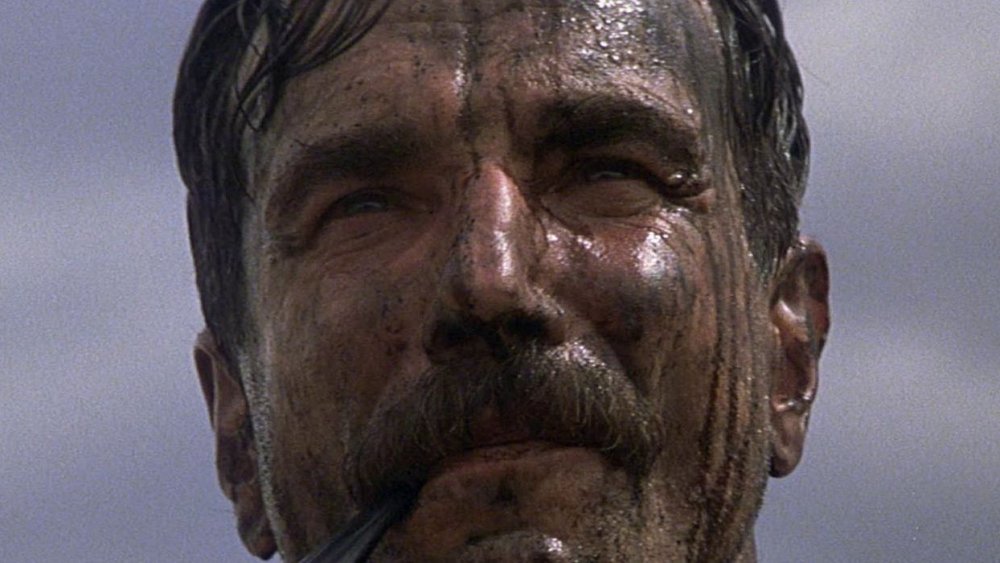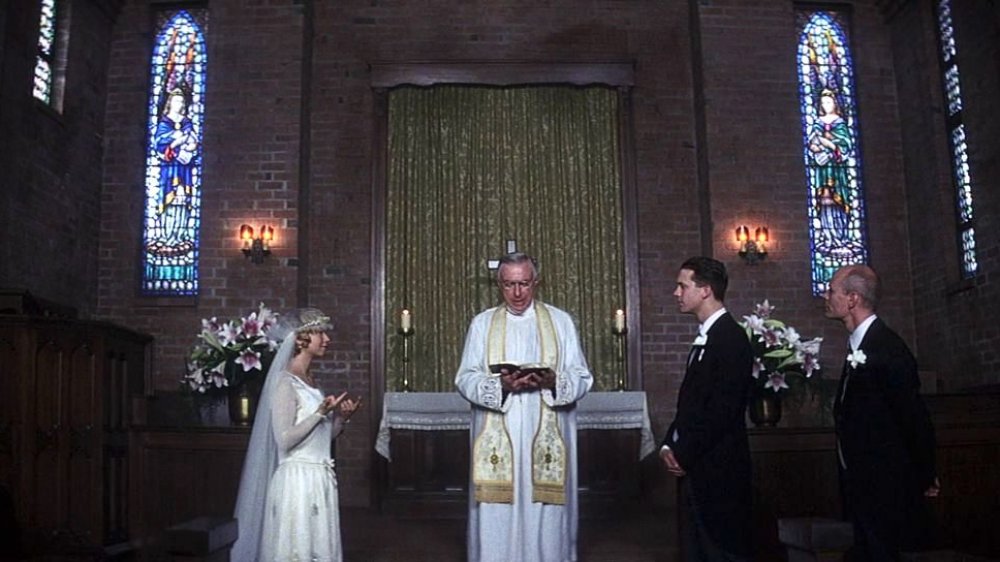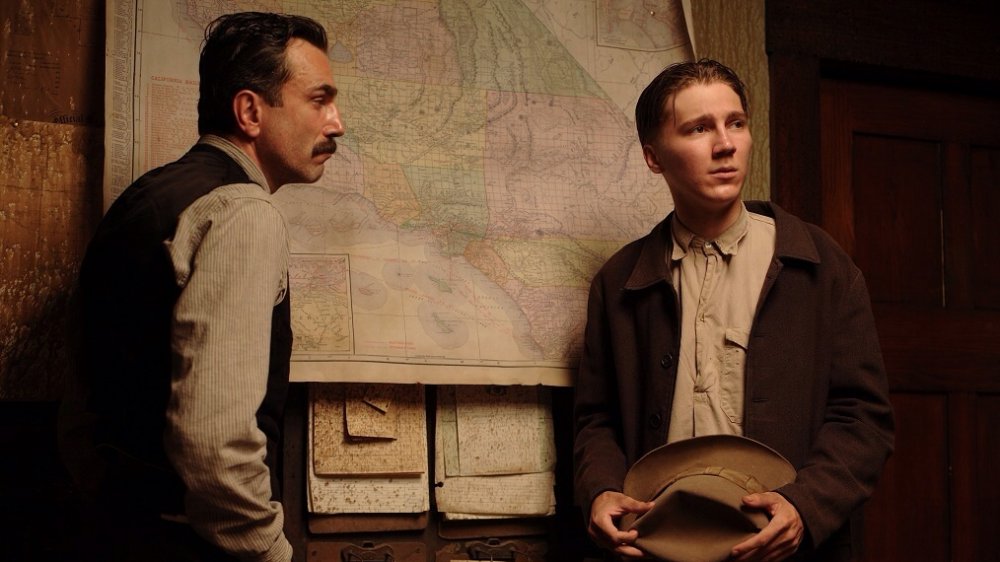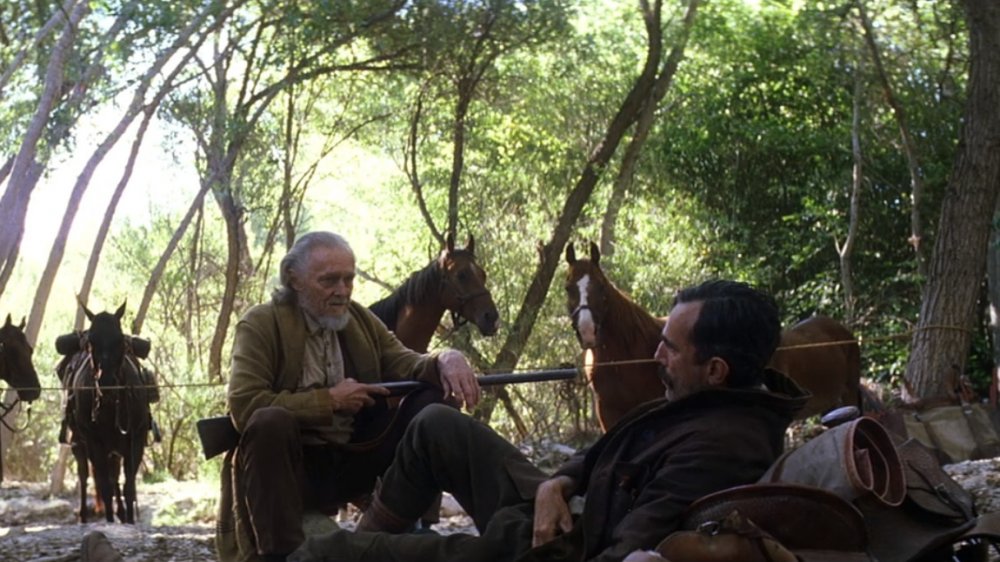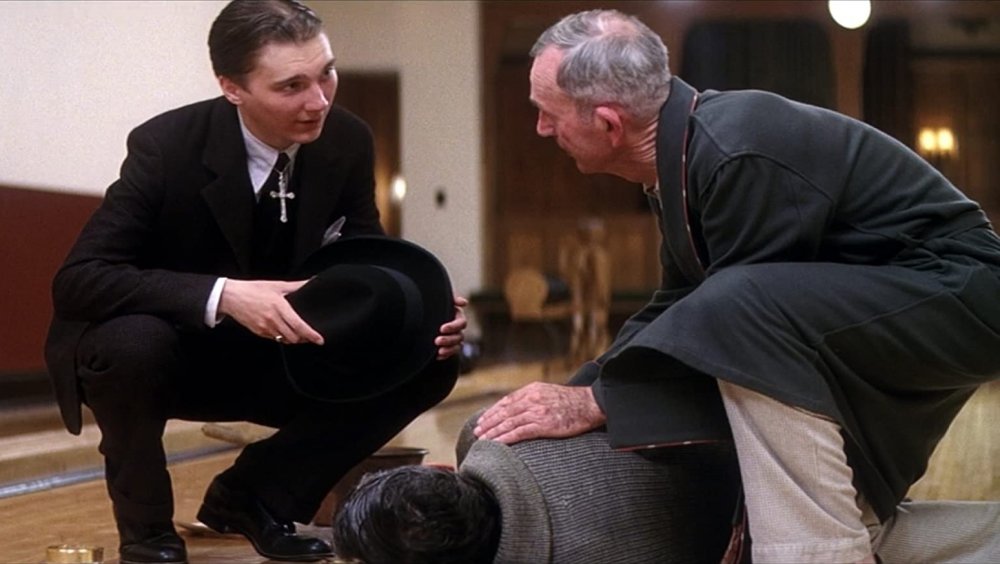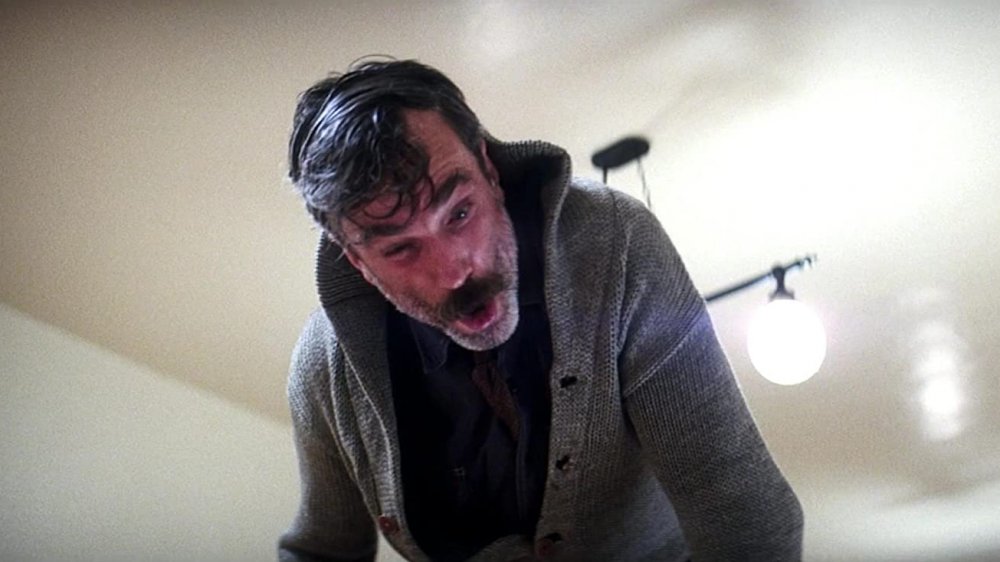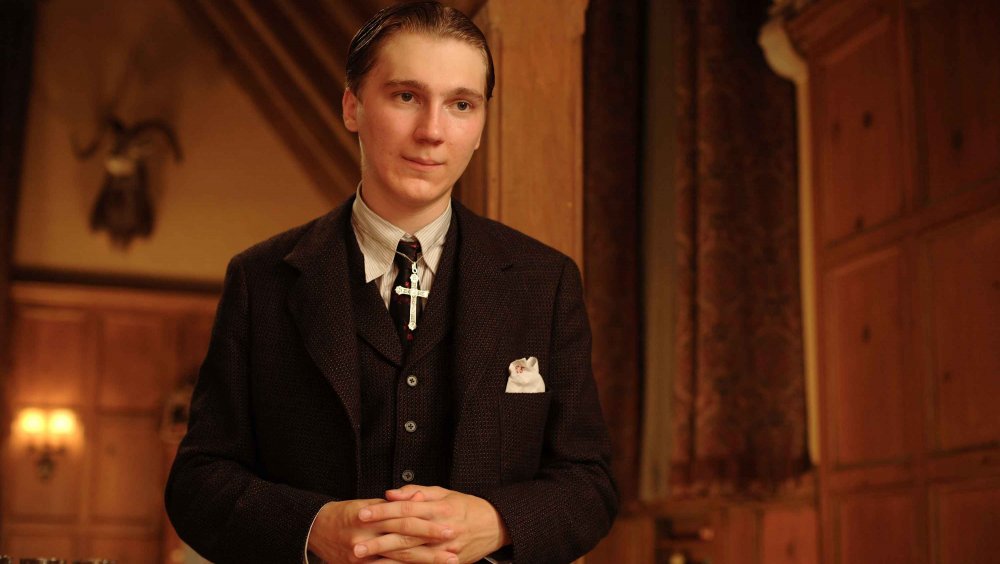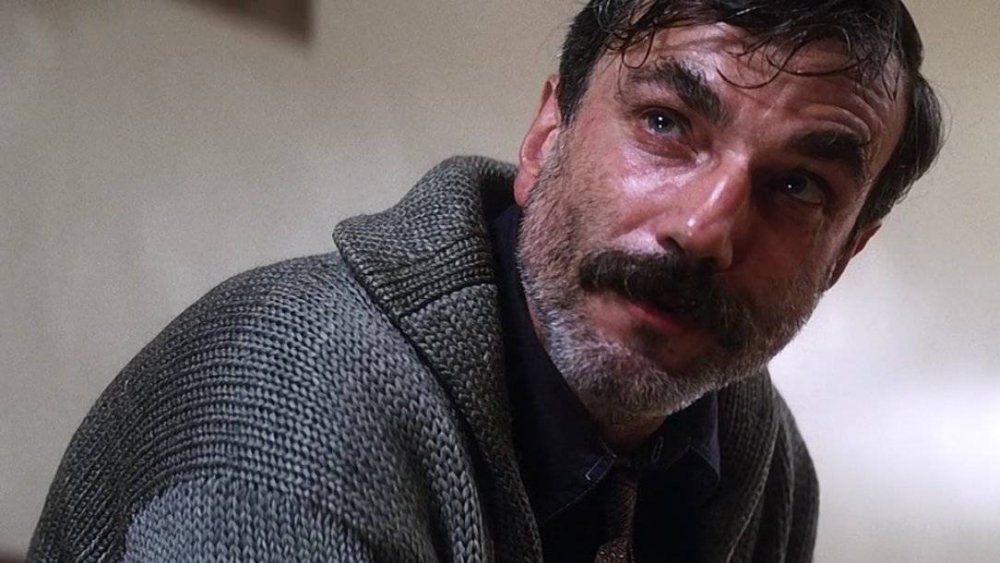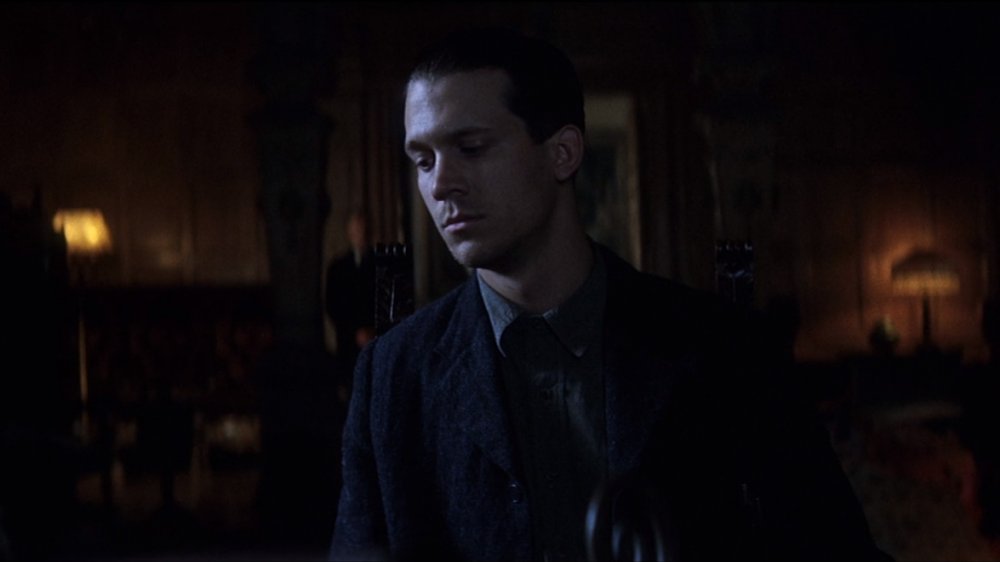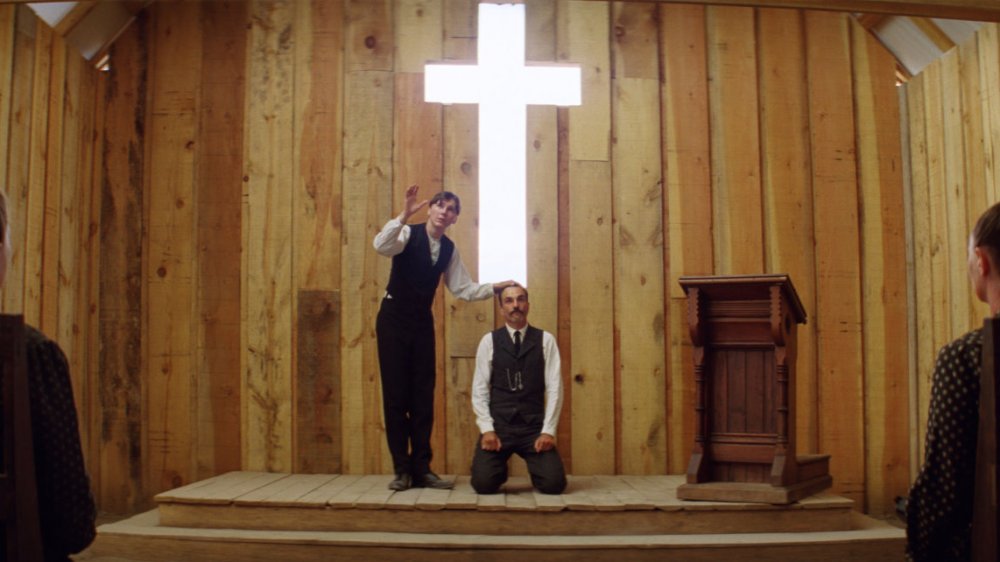The Ending Of There Will Be Blood Explained
In 2007, writer/director Paul Thomas Anderson released the film that, even years later, many fans consider to be his masterpiece. Loosely based on Upton Sinclair's novel Oil!, There Will Be Blood is the story of an enigmatic prospector (Daniel Day-Lewis) who quite literally pulls himself up into wealth and success, first through silver, then through oil. But as Daniel Plainview's star rises in the American West, he comes into conflict with a determined young minister named Eli Sunday, and the two begins a years-long cold war that will eventually boil over into something much hotter.
There Will Be Blood was one of the most acclaimed films of its year, and it went on to become one of the most celebrated films of the 2000s, earning numerous accolades for Anderson and for Day-Lewis, who won his second Best Actor Oscar for the role of Daniel Plainview. In addition to its performances, the film is remembered for gorgeous cinematography, a striking score, and of course, a brutal yet somehow enigmatic ending that still leaves viewers captivated. Today, we're here to talk about the many layers to the ending of Daniel Plainview's story.
The happiness of H.W. Plainview
There Will Be Blood ends in 1927, at a time when Daniel Plainview has long since drifted into alcoholic seclusion in his California mansion. The film doesn't tell us everything that happened in the years since the early 1910s, but we know Daniel's son, H.W., has stuck by him as his business partner. In one of the film's final scenes, though, an adult H.W. (Russell Harvard) explains that he's had enough.
H.W., who was rendered deaf by a drilling accident back in 1911, has learned to move on with his life. He learned sign language, continued to work, and even married Mary Sunday, the little girl he met alongside his father all those years ago. In 1927, he asks Daniel for a release from their father-son business partnership so he can strike out on his own in Mexico. Daniel reacts with hostility to both the idea of breaking up the business and H.W.'s own determination, and he explains to him that he's not even his real son but an orphan Daniel effectively stole from one of his dead workers. In response, H.W. simply storms off, without having really completed the business he came there for. It's possible that Daniel considered his anger to simply be a delaying tactic, but whatever the case, H.W. doesn't get what he wants that day. Whether he will continue to pursue it or not isn't clear, but other circumstances might soon get in the way.
Paul Sunday's success
There's at least one major character in There Will Be Blood who matters a great deal to the beginning of the film but doesn't seem to matter that much to the rest of it ... until the very, very end. That's Paul Sunday (Paul Dano), the young man who comes to Daniel early in the film and explains to him that his family goat farm has oil seeping up out of the ground. Daniel buys Paul off with $10,000, goes to the Sunday farm, and realizes there is indeed a lot of oil money to be made there. He also buys off Paul's brother, Eli (Dano again), with $10,000, which Eli demands to help build up his church. While Eli is present for the rest of the film, we don't really see Paul again.
So, what happened to the second Sunday brother, the one we met first, the one who was eager to exploit the oil present on his family's land? During his confrontation with Eli at the end of the film, while taunting him for his financial trouble, Daniel reveals that while Eli spent his money on the church, Paul invested his cash in his own oil company. All these years later, in 1927, he has three wells and is making $5,000 a week. So, despite Eli's radio preacher posturing, Paul turned out to be the most successful brother, just by making a deal and walking away.
Bandy family secrets
Midway through the film, during the 1910s, Daniel's half-brother, Henry (Kevin J. O'Connor), comes to him looking for work. Henry becomes a trusted part of Daniel's company for a while, and together, they begin exploring the land around the Sunday farm to expand their holdings. Then, after a young H.W. (Dillon Freasier) tries to burn Henry in his sleep, Daniels grows suspicious and confronts his half-brother. It turns out that Henry isn't his sibling but an impostor who took the place of the real Henry Plainview, who died of tuberculosis. Daniel murders Henry and buries him in the woods, only to be found the next morning by William Bandy (Hans Howes), the last holdout in the area who hasn't let Daniel drill on his land.
Daniel is pressured by Bandy, who reveals that he knows what Daniel did the night before, to go to Eli's church and be baptized in exchange for pipeline rights on his land. Daniel agrees to his conditions, and both men seem to move on. We later learn that Bandy passed away, but what we don't know is whether or not he ever told anyone else about Daniel's crime. Maybe he took it to his grave, but maybe there's someone else out there who could also tell people a thing or two in an upcoming murder trial, should Daniel's sins in 1927 ever land him in a courtroom.
The Bandy tract legacy
There Will Be Blood is a film that very much keeps its focus on Daniel Plainview's singular, ruthless drive for profit and success above all else, and therefore, it doesn't spend a whole lot of time filling us in on the private lives of other characters beyond Daniel's direct impact on their existence. That said, we do get a few details here and there, even about people Daniel has perhaps never directly met.
At the end of the film, when Eli arrives at Daniel's house to ask him to finally lease the Bandy tract, he explains that William Bandy has died, but that he has a grandson who's also named William. Young William is a member of Eli's Church of the Third Revelation, and according to Eli, he's moving to Los Angeles to try out a career in Hollywood, therefore he's less interested in his grandfather's land than Eli is.
The film doesn't go into detail about this, but based on what we learn about Eli throughout the rest of the scene, it would seem that young William Bandy is either unconcerned with his family's holdings and their potential, or he's yet another victim of what Daniel would consider Eli's religious exploitation. It's that idea, that Eli continues to bleed the community with his promises of miracles, that helps drive Daniel to his ultimate act.
The final confrontation in There Will Be Blood
There are numerous finer points worth digging into with the ending of There Will Be Blood, but at its heart, the film is largely about the confrontation between Eli Sunday and Daniel Plainview, and in the end, it's their fiery final clash that proves the most vital part of the film's conclusion.
Years after Daniel was forced to beg forgiveness for his sins in what amounted to a public shaming in Eli's church, all in exchange for his beloved pipeline, it's Eli's turn to come to Daniel and ask for something. Though he hides it at first, over the course of their conversation, it becomes clear that Eli is now suffering financially, while Daniel is wealthy thanks to, among other things, drilling near the Bandy tract so he could secretly take the oil beneath it without actually using the land. This removes the last viable card from Eli's deck, and Daniel is eager to gloat about it. After shaming Eli and forcing him to proclaim himself a false prophet, Daniel flies into a gleeful rage and murders Eli on the floor of his private bowling alley.
It's an incredible moment, made all the more powerful by Daniel's momentary hesitation after he realizes he finally has the opportunity to end this years-long feud. For a second, it seems he doesn't really want to do it, but once he lays into Eli with a bowling pin, he doesn't relent until there's a pool of blood.
What happened to Eli's flock?
When Eli first arrives at Daniel's mansion, he seems every bit the victor in their struggle. Daniel is wealthy, of course, but he's also a self-destructing alcoholic who only recently had a falling out with his adopted son. He has money but little else, while Eli still seems to be every bit the proud man of God that Daniel knew the last time they saw each other. In fact, he even seems to have made some personal improvements. He dresses in more expensive clothes, sports a fancy silver cross around his neck, and tells Daniel that he's been traveling frequently while also bringing his teachings to the radio. By all outward appearances, whatever else he may have done, Eli has amassed an even larger flock.
So, what happens to his followers with Eli gone? What becomes of the Church of the Third Revelation, both at home and across the airwaves? Has Eli spent any time grooming other ministers to follow in his footsteps, or has his own ego kept him as the sole voice of God to his flock? Has he invested at all in the future, or has he simply soaked in the adulation of the masses? And now that he's dead, even if his death is never known to his flock, what will they do in his absence? Did Eli ever really strengthen their faith, or did he just strengthen his own cult of personality?
Daniel's final fate in There Will Be Blood
They Will Be Blood ends just moments after Daniel Plainview bludgeons Eli Sunday to death with a bowling pin in his mansion. The last things we see in the film are Daniel sitting beside Eli as he bleeds out and Daniel's butler coming down the stairs to see what all the commotion was. When he notices his man is watching him, Daniel doesn't react with panic or even ask for help. He simply says, "I'm finished," and the film ends.
Which, of course, leads us to wonder what happened to Daniel. We don't know if Eli told anyone he was going to see Daniel that day, and it's possible that he told no one. If that's the case, and Daniel's man is loyal, he might be free and clear. But there's also the possibility that young William Bandy, who may already be in Los Angeles, knows about Eli's intentions to go and visit Daniel. If that's the case and the police come snooping, Daniel could eventually be arrested. Even with that in mind, though, the overall arc of the film suggests that Daniel's vast wealth will, one way or another, continue to support him as the final victor in his struggle against Eli.
H.W.'s professional future
Shortly before he murders Eli Sunday in his basement bowling alley, Daniel Plainview gets a visit from his son, H.W., who wants to end their partnership so he can start his own company. Daniel blusters at this idea, berates H.W. for it, and goes on to tell him that he's not even really his son. H.W., in response, says he's glad they're not blood relatives and walks out on his father.
A short while later, Daniel becomes a murderer for the second time that we know of, Eli's body is in his bowling alley, and we don't know what happens next. Now, it's certainly possible that Daniel's wealth and power could essentially buy him immunity from arrest and prosecution for Eli's murder. It's even possible that some of his hired men could simply make the body disappear entirely. But what happens if Daniel actually does go down for killing Eli? What if his last sin is the one that finally dooms him? If that's the case, it's quite possible that H.W. will get everything he wanted and then some. With no official paperwork in place to dissolve their relationship. H.W. may become the reigning Plainview, getting his father's wealth and his own company at the same time.
There Will Be Blood is all about capitalism vs. faith
There Will Be Blood spends a great deal of time setting up and then paying off a major conflict between two powerful men — the capitalist Daniel Plainview and the minister Eli Sunday. Their standoff begins when Eli exploits Daniel for money for his church, then continues as Eli publicly shames Daniel in exchange for pipeline rights. Of course, years later, Daniel ultimately gets the last word, and he gets to both shame Eli and then murder him. Their struggle, played out across nearly two decades, makes up both the emotional backbone of the film and the thematic one, because ultimately, it's a struggle of capitalism vs. faith.
In the end, Daniel wins this struggle because he's willing to give in to Eli's faith when it suits him, only to turn his back on it later. When Eli gives in to his own capitalist nature, though, he lacks the fortitude to handle it, whereas Daniel has long since sold his soul to oil. Speaking about his own personal relationship to this conflict, writer/director Paul Thomas Anderson told The Guardian, "Well ... I'm kind of equal opportunity confused and rooting for the best sides of both."
So, there are no easy answers at the end of the this conflict. Both men perhaps have a point, and both men are also quite wrong in various respects. The answer lies somewhere in between.
